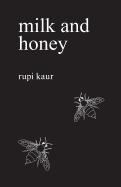
Rupi Kaur's milk and honey is a collection of prose and poetry that explores themes of silence, abuse, womanhood, family, connections and personal power. Kaur divides the work into four sections--hurting, loving, breaking, and healing--that mirror the poet's growth. In the section "the hurting," Kaur explores the idea of otherness within oneself, how one cannot be at home in one's own body and how so many experiences affirm that to be a woman is undesirable and alien. Her trauma related to alcoholic family members, abuse and rape shape the poet's fraught psyche, leaving a sense of insecurity and confusion that permeates every page. This confusion is directed both toward understanding her place in the world as an individual and her relationships with others.
One of Kaur's overarching themes is the act of silencing women, which furthers a woman's sense of otherness. In childhood the poet witnesses her father "shov[ing] the word hush/ between her [mother's] lips" and shaming her into silence when she tries to speak at the dinner table. These acts of almost casual abuse teach the poet that women are not allowed to have voices unless granted by others. In the poem titled "the idea of shrinking is hereditary" she struggles to realize her own self-worth:
trying to convince myself
i am allowed
to take up space
is like writing with
my left hand
when i was born
to use my right
While deeply personal, Kaur's words have a larger affect on her audience. She confronts taboos and questions figures of authority through the juxtaposition of domestic scenes and of abuse, rendered in both word and line drawings. Acting as a witness, she questions the relationships she observes and participates in within a home environment, including that of her parents:
i can't tell if my mother is
terrified or in love with
my father it all
looks the same
Even in the sections "the loving" and "the breaking," Kaur is not yet secure in herself. The poet continues to struggle to find her own worth and looks to others to give her power. In "the loving," she is consumed by love, or what she thinks is love, with an unnamed lover:
you talk too much
he whispers into my ear
i can think of better ways to use that mouth
In this, her lover tries to suppress her identity, leading to the next section, "the breaking," where she struggles to reclaim herself. This is where readers begin to see Kaur's strength. While all of her poems come from a place of vulnerability, in these last sections her words begin to feel sublime, impressing upon readers a sense of power, even as she shares moments of feeling powerless.
Throughout milk and honey, each poem captures a moment that reveals common experience. While not often discussed openly, many of the issues she brings into focus speak to greater cultural and societal problems. Events she shares, including instances of rape, are considered shameful and are not openly discussed even among friends. She engages with the truth of her experiences, and it is not pleasant or pretty. In calling out her own past, Kaur breaks the restrictions placed on her by everyone who tells women to be silent, and she empowers others to do the same.
you tell me to quiet down cause
my opinions make me less beautiful
but i was not made with a fire in my belly
so i could be put out...
Her poems remind women of their personal power, not given by others but innately possessed. In this way, the prose and poetry in this collection often feel like a call to action, a plea for self-acceptance directed toward women. She celebrates women and womanhood, and shows how being a woman can be strength, something she did not recognize early in her life.
you tell me
i am not like most girls
and learn to kiss me with your eyes closed
something about the phrase--something about
how i have to be unlike the women
i call sisters in order to be wanted
makes me want to spit your tongue out
like i am supposed to be proud you picked me
as if i should be relieved you think
i am better than them
Her words create a sense of communal and global kinship. Experiencing these pieces in consecutive order, readers see the poet processing trauma and moving through significant growth. Her themes evolve, gradually reaching toward empowerment and trust in self. To read this collection is to go through hardship, and find healing on the other side. But healing is not a destination; Kaur reveals healing to be an ongoing process that has no end and requires constant practice. She shows us that true healing requires a love of self and the confidence to speak up and speak out. --Justus Joseph

